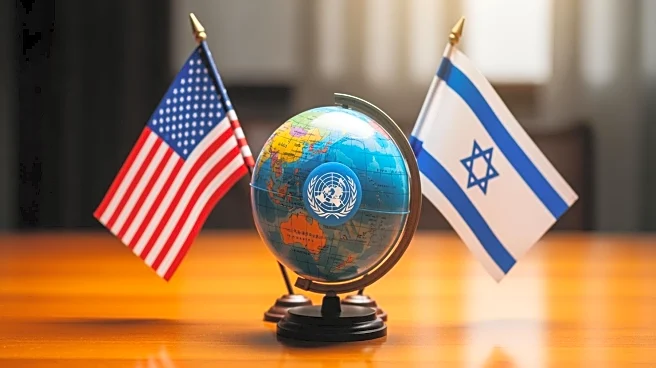What's Happening?
The United States, in collaboration with Israel, is preparing a resolution for the United Nations Security Council to establish a post-war security stabilization force in the Gaza Strip. This initiative
aims to secure international support without imposing restrictive conditions on Israel or granting the Security Council direct control over Gaza's security. The proposal seeks a general, non-binding resolution to avoid a formal UN mandate that could limit Israel's operational freedom. The resolution is being crafted with close coordination between Washington and Jerusalem, with the goal of encouraging international contributions to the force while avoiding the invocation of Chapter 7 of the UN Charter, which allows the use of force. The urgency of the proposal is partly due to pressure from Arab states, which require a Security Council resolution for legitimacy before committing troops.
Why It's Important?
The proposed resolution is significant as it reflects the geopolitical dynamics and the delicate balance of power in the Middle East. By limiting the UN's role, the US and Israel aim to maintain greater control over the security situation in Gaza, which is crucial for Israel's national security interests. The involvement of countries like Indonesia, Azerbaijan, the UAE, and Egypt in the stabilization force could enhance regional cooperation and stability. However, the exclusion of European leadership, particularly France, indicates a strategic preference for a broader regional and international force. This move could impact international relations and the future of peacekeeping efforts in conflict zones, as it sets a precedent for how international forces are structured and led.
What's Next?
The next steps involve the formal introduction of the draft resolution to the UN Security Council. The outcome will depend on the negotiations and the willingness of other countries to support the initiative. Potential reactions from European states, particularly France, could influence the final wording and acceptance of the resolution. Additionally, the response from Arab states and their commitment to the stabilization force will be crucial in determining the force's composition and effectiveness. The resolution's success could lead to a new model for international intervention in conflict zones, balancing regional interests with global security concerns.










